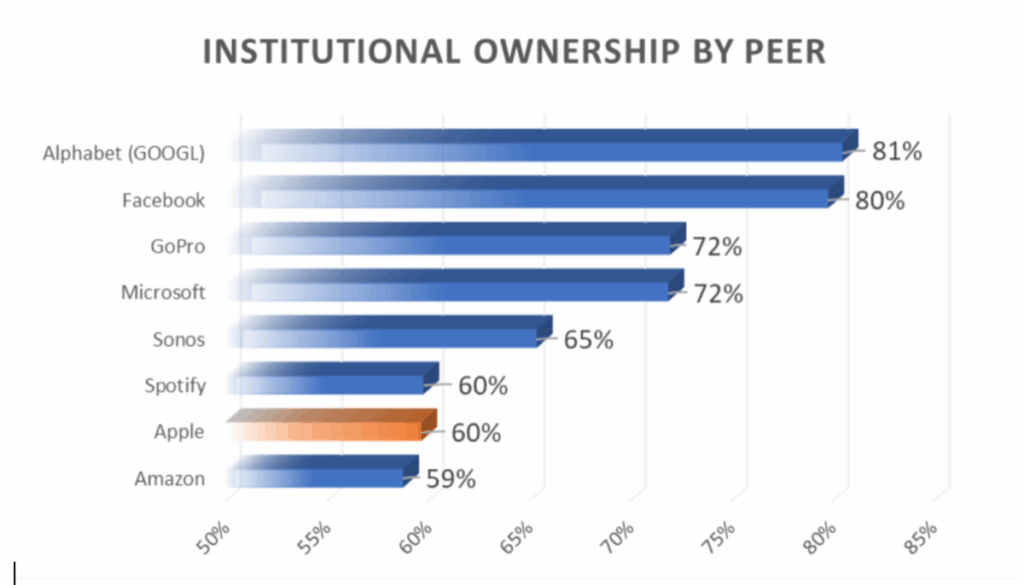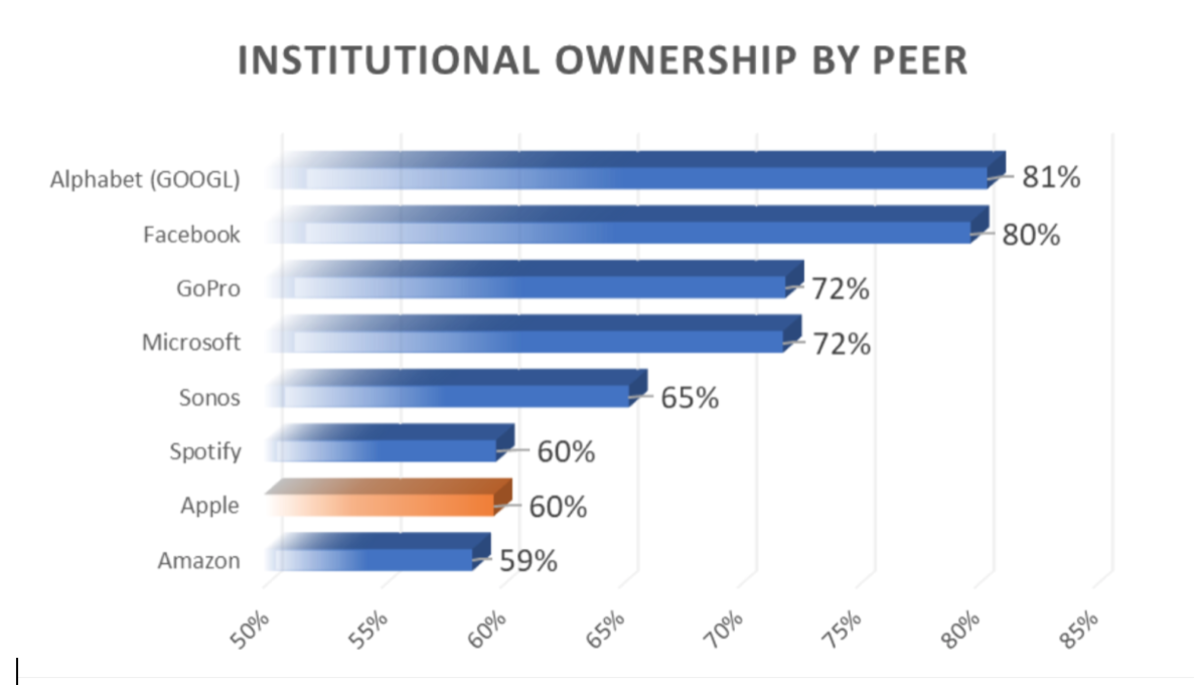
Major Apple Shareholders: Who Owns the Most Apple Stock?
Apple (AAPL) is one of the most valuable companies in the world, and understanding its ownership structure is crucial for investors and anyone interested in corporate governance. This article delves into the major Apple shareholders, examining who holds the most significant stakes in the tech giant. Knowing who the major Apple shareholders are provides insight into the company’s stability, decision-making processes, and overall strategic direction. We’ll explore the institutional investors, individual stakeholders, and the impact of their holdings on Apple’s performance.
Institutional Investors: The Big Players
Institutional investors are the dominant force in Apple’s shareholder landscape. These entities, including mutual funds, pension funds, and hedge funds, manage vast sums of money and hold substantial blocks of Apple stock. Their investment decisions can significantly influence the company’s stock price and market capitalization. Let’s take a closer look at some of the top institutional Apple shareholders:
- Vanguard Group: Vanguard is consistently among the top major Apple shareholders. Known for its low-cost index funds and exchange-traded funds (ETFs), Vanguard holds a significant percentage of Apple’s outstanding shares. Their investment strategy is largely passive, tracking major market indexes that include Apple.
- BlackRock: Another prominent asset manager, BlackRock, also holds a substantial stake in Apple. Like Vanguard, BlackRock offers a range of investment products, including index funds and actively managed funds, many of which include Apple stock.
- Berkshire Hathaway: Warren Buffett’s Berkshire Hathaway is a notable major Apple shareholder. Buffett’s investment in Apple, initially viewed with some skepticism given his traditional aversion to tech stocks, has proven to be highly successful. Berkshire Hathaway’s large stake reflects Buffett’s confidence in Apple’s long-term prospects and brand strength.
- State Street Corporation: As a major provider of financial services and asset management, State Street Corporation is also a significant Apple shareholder. Their holdings are primarily through index funds and ETFs that track broad market indexes.
These institutional investors play a crucial role in providing liquidity and stability to Apple’s stock. Their investment decisions are often based on in-depth analysis of Apple’s financial performance, market position, and future growth potential. Understanding their strategies can offer valuable insights to other investors.
Individual Shareholders: Key Insiders
While institutional investors hold the largest portion of Apple’s shares, individual shareholders, particularly company insiders, also play a significant role. These individuals, including executives and board members, often hold shares as part of their compensation packages or through personal investments. Their ownership stakes align their interests with the company’s success. Here are some key individual Apple shareholders:
- Tim Cook: As Apple’s CEO, Tim Cook holds a significant number of Apple shares. His ownership stake reflects his commitment to the company and his alignment with shareholder interests. Cook’s leadership and strategic decisions have a direct impact on Apple’s performance and stock value.
- Other Executives and Board Members: Other executives and board members also hold Apple shares, further aligning their interests with the company’s success. Their collective ownership represents a substantial portion of Apple’s insider holdings.
Insider ownership can be a positive signal for investors, indicating that those closest to the company have confidence in its future prospects. However, it’s also important to monitor insider trading activity to ensure compliance with regulations and to gain insights into their perspectives on the company’s valuation.
Impact of Shareholder Ownership on Apple’s Performance
The composition of Apple’s shareholder base has a significant impact on the company’s performance and strategic direction. Institutional investors, with their large holdings, wield considerable influence over corporate governance and decision-making. Their voting power can affect the outcome of shareholder proposals and board elections. [See also: Apple’s Corporate Governance Structure]
Moreover, the presence of long-term investors like Berkshire Hathaway provides stability and support for Apple’s stock. These investors are less likely to be swayed by short-term market fluctuations, allowing Apple to focus on its long-term strategic goals. The major Apple shareholders often engage with the company’s management to discuss performance, strategy, and corporate governance issues.
Understanding the motivations and investment horizons of Apple shareholders is essential for assessing the company’s long-term prospects. Investors should consider the composition of the shareholder base when evaluating Apple’s stock and making investment decisions.
Analyzing Shareholder Activity
Keeping track of the buying and selling activity of major Apple shareholders can provide valuable insights into their perspectives on the company’s future. Regulatory filings, such as Form 13F, disclose the holdings of institutional investors, allowing investors to monitor changes in their positions. [See also: Understanding SEC Filings for Apple Stock]
Significant increases or decreases in institutional ownership can signal changes in sentiment towards Apple’s stock. For example, a large increase in institutional buying may indicate growing confidence in the company’s prospects, while a significant decrease may suggest concerns about its future performance. These changes can influence the stock price and overall market sentiment.
It’s important to note that not all changes in shareholder ownership are indicative of fundamental changes in the company’s prospects. Institutional investors may adjust their holdings for a variety of reasons, including portfolio rebalancing, changes in investment strategy, or regulatory requirements. Therefore, it’s crucial to analyze shareholder activity in conjunction with other factors, such as Apple’s financial performance, market trends, and competitive landscape.
The Role of Retail Investors
While institutional and insider shareholders dominate Apple’s ownership structure, retail investors also play a role. These individual investors, who buy and sell shares through brokerage accounts, contribute to the overall liquidity and trading volume of Apple’s stock. Although their individual holdings may be small compared to institutional investors, their collective ownership can be significant.
Retail investors are often drawn to Apple’s stock due to its strong brand recognition, loyal customer base, and history of innovation. They may invest in Apple as part of a diversified portfolio or as a way to participate in the growth of the technology sector. The sentiment of retail investors can influence the stock price, particularly during periods of market volatility.
Future Trends in Apple’s Shareholder Base
The composition of Apple’s shareholder base is likely to evolve over time, influenced by factors such as changes in market conditions, shifts in investor preferences, and the company’s own strategic decisions. As Apple continues to grow and innovate, it may attract new investors with different investment horizons and objectives. [See also: Apple’s Innovation Pipeline and Future Products]
One potential trend is the increasing influence of socially responsible investors, who prioritize environmental, social, and governance (ESG) factors in their investment decisions. Apple has made significant strides in improving its ESG performance, which may attract more socially responsible investors to its stock. The growing focus on ESG may also lead to greater shareholder engagement on issues such as climate change, diversity, and human rights.
Conclusion: Understanding Apple’s Ownership Structure
In conclusion, understanding the major Apple shareholders is crucial for investors and anyone interested in the company’s performance and strategic direction. Institutional investors, such as Vanguard, BlackRock, and Berkshire Hathaway, hold the largest portion of Apple’s shares, while individual shareholders, including executives and board members, also play a significant role. The composition of Apple’s shareholder base influences the company’s corporate governance, decision-making processes, and overall stability.
By analyzing shareholder activity and monitoring changes in ownership, investors can gain valuable insights into the perspectives of those closest to the company and make more informed investment decisions. As Apple continues to evolve and adapt to changing market conditions, its shareholder base will likely evolve as well, reflecting the company’s ongoing success and innovation. Keeping an eye on who the major Apple shareholders are remains a key part of understanding this influential tech giant.

